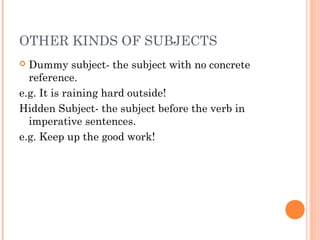Sentences
- 1. SENTENCES Grace Vanessa V. Red
- 2. WHAT IS A SENTENCE? ïĒ It is a group of words that makes a statement and can be followed by a period or other terminal punctuation, question mark, or an exclamation mark. It has the principal elementsâ the subject and the predicate, or in more technical senseâ an NP (noun phrase) and VP (verb phrase)
- 3. SUBJECT ïĒ Simple Subject- main noun or pronoun alone that performs the action. e.g. Jane went home. ïĒ Complete Subject- the noun phrase that has its main noun or pronoun and its modifiers e.g. The new teacher taught English to foreigners. ïĒ Compound Subject- consists two or more nouns and/ or pronouns Anne and her young daughter watched Les Miserables.
- 4. OTHER KINDS OF SUBJECTS ïĒ Dummy subject- the subject with no concrete reference. e.g. It is raining hard outside! Hidden Subject- the subject before the verb in imperative sentences. e.g. Keep up the good work!
- 5. PREDICATE ïĒ It is the information about the subject. It is composed of a group of words that states what the subject does or is. e.g. Jane went home late.
- 6. KINDS OF PREDICATE Sentence: The new teacher taught English to foreigners. ïĒ Simple Predicate- is the important verb or verb phrase in the sentence. E.g. taught ïĒ Complete Predicate- is the verb phrase, as well as its modifiers and/ or complements that tell what the complete subject is. e.g. Taught English to foreigners
- 7. ïĒ Compound Predicate- it is composed of two or more verbs that have the same subject. The verbs are joined by a coordinating conjunction. e.g. Anne left the house early but arrived late for work.
- 8. TYPES OF SENTENCES ACCORDING TO STRUCTURE ïĒ Simple Sentence ïĒ Compound Sentence ïĒ Complex Sentence ïĒ Compound- complex Sentence
- 9. SIMPLE SENTENCE Composed of a single independent clause. This means that it consists of one or more subjects and one or more verbs.
- 10. EXAMPLE: Examples One subject and one verb The bird built a nest made of twigs and leaves for its young. One subject and two verbs The actress cried and laughed at the same time. Two subjects and one verb Pam and Tony were given awards by the school principal.
- 11. COMPOUND SENTENCE Independent clause+ coordinating conjunction + Independent Clause
- 12. EXAMPLE Two independent clauses She dictated and I typed.
- 13. COMPLEX SENTENCE Independent Clause + Dependent clause
- 14. EXAMPLE He went abroad + for his family
- 15. Two independent clauses+ one or more dependent clause/s COMPOUND- COMPLEX SENTENCE
- 16. EXAMPLE: ïĒJam forgot his engagement, so he failed when he told the news to the director.
- 17. TYPES OF SENTENCES ACCORDING TO PURPOSE ïĒ Declarative Sentence ïĒ Interrogative Sentence ïĒ Exclamatory Sentence ïĒ Imperative Sentence
- 18. CLASSIFY THE FOLLOWING SENTENCES ACCORDING TO PURPOSE ïĒI love you. ïĒDo you love me? ïĒLove me. ïĒI love you!
- 19. IDENTIFY THE TYPE OF SENTENCES ACCORDING TO STRUCTURE. WRITE SS FOR SIMPLE, CS FOR COMPOUND, CXS FOR COMPLEX, AND CCS FOR COMPOUND- COMPLEX. ____________ 1. Nelia and Jristan have an arrangement every summer over where they should spend their Christmas vacation. ____________ 2. Rey loves to go in the farm and spend his days planting. ____________ 3. Benjo likes the view that he gets from the rooftop and he enjoys listening to music while he is here. ____________ 4. Leah says that it is exciting to carve wood, chase chicken, and camp. ____________ 5. Tony dislikes sitting on the beach; he always gets a nasty sunburn.
- 20. READ THE SENTENCES. BOX THE SUBJECT OF THE SENTENCE AND UNDERLINE THE PREDICATE. ïĒ1. The girl plays the piano well. ïĒ2. The hunter caught the fox. ïĒ3. Stop! ïĒ4. The sun sets at the west. ïĒ5. Yesterday we played football.
- 21. MAKE A 4-LINE POEM CONSISTING THE FOUR TYPES OF SENTENCES ACCORDING TO PURPOSE WITH THE THEME: EDUCATION FOR PEACE . (10 POINTS)





















